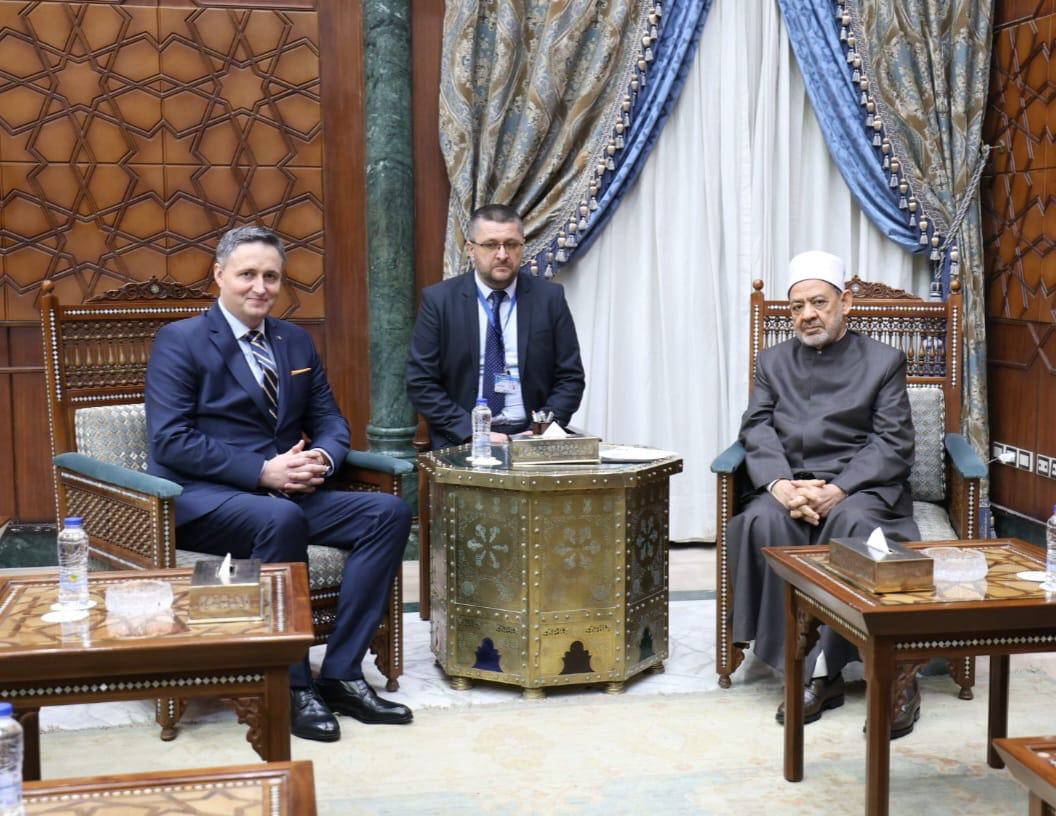In 2023, the Muslim Council of Elders embarked on pioneering historical initiatives aimed at promoting values of tolerance, peaceful coexistence, and fostering Islamic-Islamic dialogue. These groundbreaking efforts were prompted by the call of His Eminence Dr. Ahmed El-Tayeb, the Grand Imam of Al-Azhar and Chairman of the Muslim Council of Elders, to conduct a serious Islamic-Islamic dialogue. The purpose of this dialogue is to enhance unity, promote convergence, cultivate mutual understanding, strengthen religious and human fraternity, and reject the root causes of division and discord, particularly those related to sectarian conflicts, with a distinct emphasis on highlighting areas of agreement and convergence.
Within the context of His Eminence Dr. El-Tayeb’s invitation, a significant and purposeful visit was undertaken by a distinguished delegation from the General Secretariat of the Muslim Council of Elders to the Republic of Iraq, covering Najaf, Baghdad, and Erbil. The primary objective of this visit was to engage in a meaningful and impactful dialogue with all segments of the Iraqi people, building bridges of effective communication and establishing a new era of mutual understanding among all Islamic sects.
The Muslim Council of Elders attaches great importance to fostering Islamic-Islamic dialogue as a fundamental means of promoting unity and peace within Muslim societies. The visit to Iraq marks an initial stride in this direction, pledging to persist in this constructive approach to build confidence and cultivate mutual respect among adherents of various sects within the same community, ultimately realizing peace and overall harmony.
The visit of the delegation from the General Secretariat of the Muslim Council of Elders to Iraq included three significant stations, commencing in the city of Najaf with a meeting with a distinguished group of professors and religious scholars at Al-Khoei Institute. The delegation also met with the Representative of the Supreme Shia Authority, His Eminence Sayyid Ali al-Sistani, and his authorized deputy, Sheikh Abdul-Mahdi al-Karbalai. The dialogue focused on addressing contemporary challenges facing the Arab and Islamic nation, ways to mend divisions, elevate the spirit of religious fraternity, and emphasize the importance of cooperation and understanding among the followers of the same faith.
The second stop of the visit was the capital, Baghdad, involving a meeting with the Iraqi Prime Minister, His Excellency Mohammed Shia' al-Sudani, and various religious and community leaders in Baghdad. This included a meeting with the Head of the Sunni Endowment Office in the Republic of Iraq, Dr. Mishaan Al-Khazraji and Sheikh Dr. Hamed Abdul Aziz al-Sheikh Hamad, who is the head of the Scholars League Association in Iraq, and the Imam and Preacher of Al-Ma'rufiya Mosque. Additionally, there was a meeting with the Chief Scholar of the Iraqi Fiqh Council, Sheikh Dr. Ahmed Hassan al-Taha. A visit was also made to the Abu Hanifa al-Nu'man Mosque. The discussions emphasized avenues for developing cooperation between the Muslim Council of Elders and Iraqi institutions, along with joint projects aimed at enhancing religious fraternity and human coexistence, both locally and globally.
In Erbil, the third stop of the visit, the delegation from the General Secretariat of the Muslim Council of Elders engaged with His Excellency Pshtiwan Sadq Abdullah, Minister of Endowment and Religious Affairs in the Kurdistan Region. The meeting, attended by the Head of the Iraqi Sunni Endowment Office and the Head of the Union of Scholars of the Kurdistan Region, aimed to explore avenues for enhancing coexistence, tolerance, and peace. It also focused on the role of religions in disseminating and solidifying the values of dialogue and effective communication among various sects and doctrines.
This visit received significant attention and a warm welcome from all segments of the Iraqi people, who are eagerly anticipating the upcoming historic visit of His Eminence Dr. Ahmed El-Tayeb, the Grand Imam of Al-Azhar and Chairman of the Muslim Council of Elders, to Iraq. The visit holds paramount importance in supporting the issues of the Islamic nation, particularly in promoting unity, solidarity, and cohesion. Although preparations for this visit began a long time ago, the plans were postponed due to the COVID-19 pandemic. The official and popular authorities in Iraq have renewed the invitation to Sheikh Al-Azhar to proceed with the visit.
ENDS
About The Muslim Council of Elders:
The Muslim Council of Elders is an independent international organization founded in Abu Dhabi on Ramadan 21, 1435 Hijri (July 19, 2014). Its central aim is to promote peace in both Muslim and non-Muslim societies and to disseminate and strengthen the values of tolerance, dialogue, and mutual coexistence. Led by His Eminence Dr. Ahmed El-Tayeb, the Grand Imam of Al-Azhar, the Council's membership includes a distinguished assembly of scholars, experts, and leaders renowned for their wisdom, justice, independence, and moderation.
